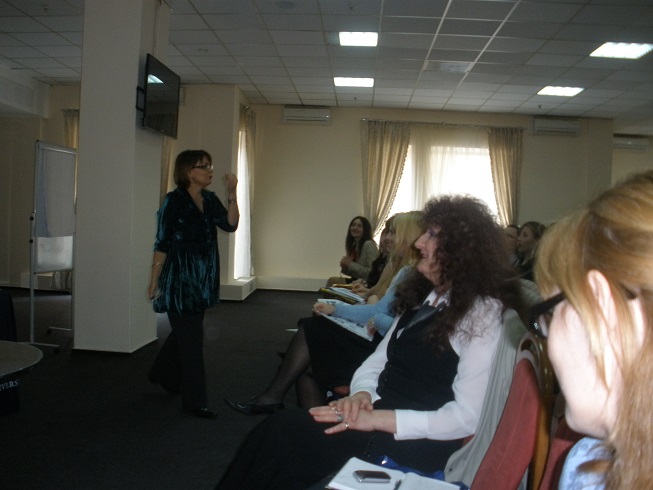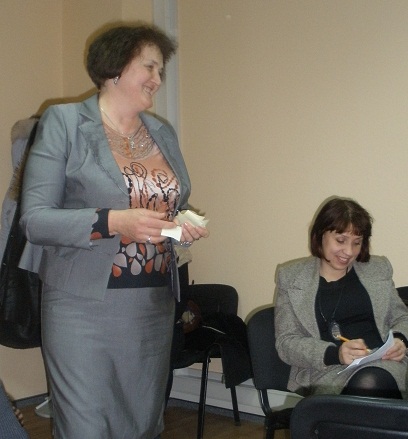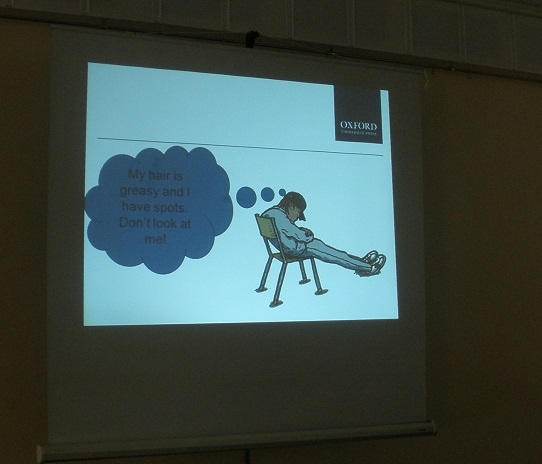Olha Madylus's ideas: [size=16]Eight top strategies to becoming a better teacher!
A young teacher in Marrakech last week asked me what makes a good teacher and it got me thinking about how best to develop and learn as a teacher. We may be born to teach, but that doesn’t mean we can’t become more effective teachers. In my book, if I’m not going forward, I’m going backwards! However well trained you are, there is always more to learn.1.
1. Take every opportunity to go to training events locallyPublishers and local teachers’ organisation put on training events regularly in many places. Find out about these, get on a mailing list or join the organisation and attend events, if you can. You will have a chance to listen to presentations, meet other teachers and exchange ideas as well as see the latest books and materials. And if you are lucky you may win a book in a raffle!If there isn’t a teachers’ organisation in your area, why not put one together. A monthly coffee morning of enthusiastic teachers sharing ideas is a great way to start.Or get contact details from like-minded teachers you meet and share ideas via facebook or email. Virtual teachers’ club are great, too.
2. Collaborate Our problem as teachers is that we often work in a bubble. We are in the classroom with the door shut. If we work in a school where the culture is one where teachers don’t discuss their teaching, that’s tough. But everyone probably feels equally isolated. Get the ball rolling. Start talking about your lessons in the staffroom – the triumphs as well as the problems. Ask for advice from other teachers. I have learned more from my fellow teachers in the staffroom than from books! If possible ask a colleague to observe you and give you feedback. Then ask to observe that colleague. You may even start a new fashion in your school of teachers sharing ideas and learning from each other. That’s much easier and cheaper than attending training courses out of school time.
3. Reflect / diary Think about the lessons you have taught. What went well? How can you do that again? What didn’t go as well? How can you improve?Keeping a journal / diary is a good idea. Or making notes on your lesson plans, which you can refer to later.
4. Experiment. It’s easy to get stuck in a rut, like just teaching from the book. Move out of your comfort zones and try something different. Start small, for example introduce short 5 minute games as warmers at the beginning of the lesson and see how these go down. If you find out about an activity that sounds good from another teacher or a trainer, do it with your students. Remember that the worst thing that could happen is that students just won’t respond as you hoped. I am always reassured by the fact that I really cannot kill any of my students when I experiment! And that usually when I do we all learn something new.
5. Get online – websites and blogs
There is a lot of information and free material out there online. Don’t try to access it all. Ask colleagues what they find useful and make a note of websites recommended at events and try them out.
www.onestopenglish.comwww.teachingenglish.orgare two great starting points with lots of practical, free ideas.
6. Get feedback from students Ask your students what they think about activities they do in class and how they do them. They are the end-users of your skills and if they are happy and feel they are making progress learning English, you should be happy too. But sometimes you really cannot tell what students are thinking, especially those teenagers, until you ask them.
7. Set goals Don’t just have vague ideas like ‘When I am less busy, I’ll have a look at those websites’. It won’t happen! Set deadlines and clear goals, but make them achievable, e.g. read that article about reading skills this week and try out one of the activities next week. Put it in your diary.
8. Enjoy what you do My answer to that teacher in Marrakech was actually this:Be passionate about learning and teaching and put your passion into your job. Learners will feel that enthusiasm and respond accordingly.If you aren’t enjoying teaching, maybe it’s not the job for you after all.After 32 years of teaching, I can honestly say I still love walking into a classroom and spending my time trying to create the right conditions for my students, whoever they are, to learn. I know I am not always as successful as I could be, but I will never stop trying.
Olha Madylus's Blog





 "Troyeshchyna" Gymnasium Land
"Troyeshchyna" Gymnasium Land
 In December 2012 I attended a
In December 2012 I attended a

